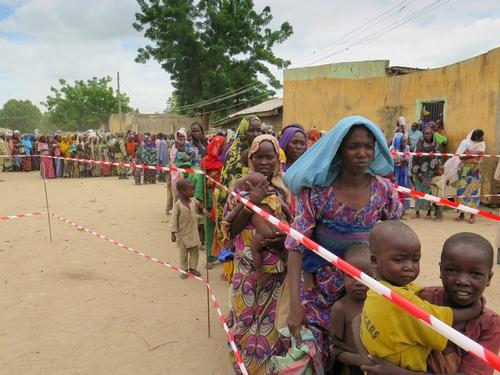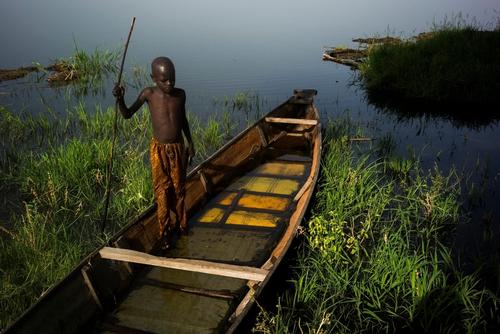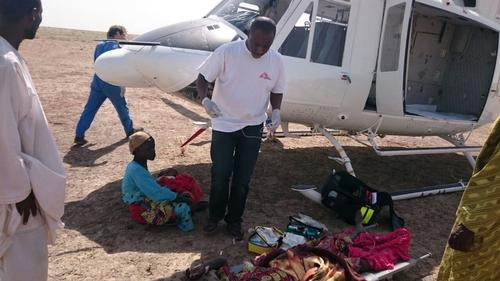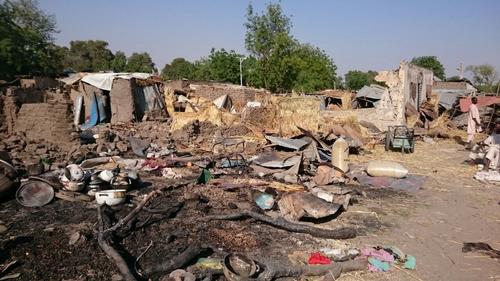The Lake Chad basin has in recent years become an important epicentre of violence, its population suffering intensified attacks by the Islamic State’s West Africa Province (ISWAP), also known as Boko Haram. At the end of 2014, ISWAP’s violence expanded from northeast Nigeria to Cameroon, Chad and Niger. Multiple suicide bombings and raids targeting civilians in villages and in cities around the Lake Chad basin have caused widespread trauma.
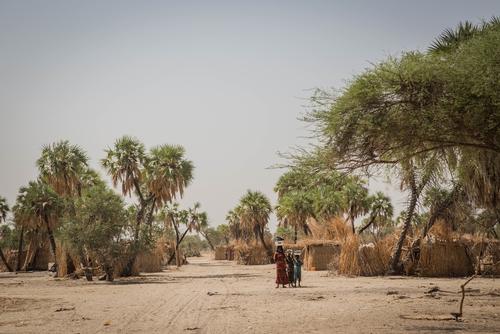
In response, the international community established a Multinational Joint Task Force involving Niger, Chad, Cameroon, Benin and Nigeria focusing exclusively on a security approach with a military containment strategy. The armed confrontation takes on a regional dynamic with direct consequences for civilian populations, including forced displacement and indiscriminate violence perpetrated by all armed belligerents.
Violence has uprooted more than 2.7 million people from their homes across the four countries, of whom 2.2 million are internally displaced in Nigeria alone. Many of the displaced have found refuge with host communities, putting a heavy strain on their already dire resources.
Thousands of schools have shut down, state services, already running at low capacity, as well as agricultural activities and cross-border trade have been dangerously disrupted. In addition, the targeting of health facilities has forced many health workers to flee.
In early June, around 70,000 people were forced from their homes in Niger’s southeastern Bosso area when ISWAP carried out a series of raids. Attacks by the armed group have been on the rise in southern Niger since March, as a result of increased pressure from military operations in Nigeria and Cameroon. Chad has seen a lull in attacks in recent months, allowing aid organisations to reach more people affected by the conflict in the western Lac region.
More areas in northeast Nigeria’s Borno State have become accessible as the military dislodges ISWAP from towns and other strongholds. But in areas where the intensity and frequency of attacks have reduced, insecurity remains a huge obstacle for humanitarian access and for people who want to return to normal life.
According to OCHA (Office for the Coordination of Humanitarian Affairs), in the entire Lake Chad basin, some 3.8 million people are now facing hunger. The violence, displacement and disenfranchisement of millions of people across the Lake Chad basin have exposed them to abuse and human rights violations.
The crisis is only aggravating an already dire situation in a region suffering from poverty, extreme vulnerability, food insecurity, recurring outbreaks of disease and an almost non-existent health system. People affected by the ongoing crisis are in urgent need of food, drinking water, shelter, healthcare, protection and education.
NIGERIA
Maiduguri
MSF has been working in Maiduguri on a permanent basis since April 2014 and had previously intervened on several occasions to help control cholera epidemics. Today, more than 1.2 million internally displaced people (IDPs) are living in Maiduguri, most of them with the host community and others in camps (informal camps and 11 official camps).
In Maimusari and Bolori health centres, MSF runs an outpatient department (OPD; 400 consultations per day in Maimusari and 300 in Bolori), an Ambulatory Therapeutic Feeding Centre (ATFC; where people seen on an outpatient basis) and a maternity ward assisting simple deliveries.
In Maimusari, the government has just handed a new building over to MSF, which which allow us to evolve from a basic health care centre to a comprehensive healthcare facility with hospitalisation capacity. MSF has recently moved its outpatient activities (OPD and ATFC) inside this new building and next week will open an inpatient department with 50 beds for paediatrics and 10 beds for referrals from camps outside Maiduguri.
In Gwange, a Maiduguri district, MSF now has an 100-bed Inpatient Therapeutic Feeding Centre (ITFC) that has received people referred from Bama (18) and Dikwa (27) on 20 July. The ITFC is under tents, in the compound of health centre run by the Ministry of Health.
Epidemiological surveillance continues in the 11 official camps and in Mouna camp, an informal settlement with around 15,000 people. People arriving in Maiduguri go first to a camp where there are security screened by the army, then go either to Mouna camp, a camp close by set up on a private land, or to Custom camp made of unfinished buildings hosting between 2,000 and 3,000 people.
The disease surveillance system is now being strengthened to react rapidly to emergencies popping up in Maiduguri and on its outskirts. Since last week, cases of measles have been reported inside Maiduguri in the so-called “Arabic teaching college” camp and outside Maiduguri in Konduga, the last big town on the road to Bama that is for now accessible without escort. MSF teams are undertaking containment and case management at these sites.
Bama
Between 13 and 15 June, Nigerian authorities and a local NGO organised the evacuation of 1,192 people requiring medical care from the Bama area to the city of Maiduguri, capital of Borno State. This group of mostly women and children was placed in the “Nursing Village” camp for internally displaced people. Out of the 466 children screened by MSF in the camp, 66 per cent were emaciated, and 39 per cent had a severe form of malnutrition. Upon assessment, 78 children had to be immediately hospitalised in the MSF feeding centre, which has an inpatient capacity of 86 beds.
A team visited Bama with a military escort for the first time on 21 June and found people in a catastrophic situation. Out of the 800 children screened, 19 per cent were suffering from severe acute malnutrition (SAM). Estimates of mortality at that time were very high. Medical data from the health centre reported 188 deaths between 23 May and 21 June, mainly from diarrheoa and malnutrition; counting of the graves in the cemetery behind the camp showed more than 1,200 graves had been dug since the internally displaced had gathered in the hospital compound. Five children died whilst the assessment was being undertaken.
MSF returned to Bama mid-July. Today, Bama is a ghost town held by the army. People live in a camp inside the hospital compound. Despite 1,500 people being evacuated by the authorities and some food distribution, the estimated malnutrition rates remain high (severe acute malnutrition is estimated at 15 per cent). An estimated 10,000 to 12,000 internally displaced (official figures 27,000) are living in terrible conditions in shelters made of rusty corrugated iron sheeting and cannot leave the camp. There are hardly any men or boys older than 12. We don’t know what has happened to them.
Another MSF team arrived on 19 July to provide medical and nutritional support: Ambulatory Therapeutic Feeding Centre, consultations, set up seven beds for observation and stabilisation, and improve water quality through chlorination. A referral system to Maiduguri has been organised with SEMA (State Emergency Management Agency) via ambulances and school buses.
Monguno
An estimated 150,000 people, including 65,000 internally displaced, are living in Monguno. They have had almost no access to healthcare since January 2015.
A team visited Monguno last week and will return again soon. The UNICEF clinic and the ALIMA clinic are currently overwhelmed. MSF are planning to restart activities in the hospital, which has not been operational for several months. First an inpatient department will be set up under tents in the hospital compound. There will be 50 beds for general cases and 50 beds for malnutrition cases.
Dikwa
Dikwa is located in an enclaved area on the frontline. An MSF team undertook a two-day assessment this week. The estimated population in the camp for internally displaced is around 55,000, with new arrivals still streaming in from the new open areas. The majority of Dikwa's inhabitants (40,000) left for Maiduguri in 2014, and around 12,000 stayed and moved into the camp. Other people have arrived from the surrounding villages. Water is a big concern in the camp, both the quantity and the quality.
Dikwa was largely deserted until the governor allowed people to visit the town and to farm the surrounding land. On 20 July, the Dikwa population were allowed to visit their houses which are being repaired by government construction workers.
UNICEF and the International Committee of the Red Cross (ICRC) have been running a clinic in the camp for several months, and the ICRC distributes food every day. A rapid screening by MSF showed that 12.5 per cent of children were suffering from severe acute malnutrition. We are considering opening an Inpatient Therapeutic Feeding Centre and an Ambulatory Therapeutic Feeding Centre in the general hospital, which is currently empty.
Damboa
Damboa, in southern Borno, has been greatly affected by the current conflict in northeast Nigeria. Currently the population is estimated at between 50,000 and 60,000, with many being displaced people from the surrounding area who are living in the town as well as in three camps. Malnutrition rates are very high, with an average of 12 per cent of children suffering from severe acute malnutrition. An MSF team has been on the ground treating patients in Damboa since 17 July, and the majority of patients seen have presented with malnutrition, malaria, diarrheoa and/or skin infections.
The ICRC has started food distribution in Damboa but access to food remains a major challenge. Water and santitation is also a big issue, as there is limited access to clean water and there are an inadequate number of latrines in the camps.
CHAD
Lake Chad region
Last year and in the first months of 2016, violence by ISWAP generated a mass movement of people within the Lake Chad region as well as, on a smaller scale, an influx of refugees from neighbouring Nigeria. In addition, the Chadian government’s response to ISWAP attacks forced tens of thousands of residents of the Lake area to leave their villages. Even if some were not directly escaping military action, many left because they were asked to by the government.
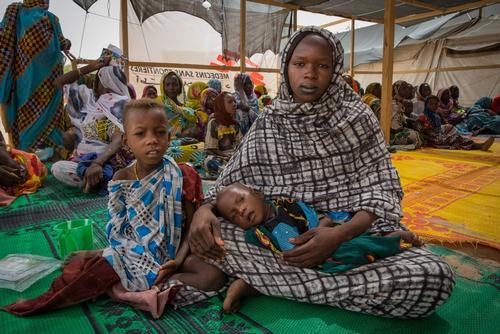
Based on OCHA figures released in June this year, over 111,000 people are currently displaced in Chad’s Lake region. This includes around 7,000 refugees, over 5,000 of whom have been living in the Dar Es Salam camp since the beginning of last year.
Although violence has since decreased and major population movements have consequently slowed, many who have settled across the Lake region have now lost their sources of livelihood and their belongings. These people are still in dire need of support.
MSF has teams based in Baga Sola and Bol, and runs mobile clinics that provide basic healthcare to displaced people and resident populations. MSF also supports a health centre in Tchoukoutalia.
In March, a mobile clinic service was launched in Djamaron, north of Liwa, around 100 kilometres from Baga Sola, where new pockets of displaced people are gathering. In June 2016, MSF added a mobile clinic that visited six new sites on the Liwa-Daboua axis.
Close to Baga Sola, MSF is also working in the Dar as Salam refugee camp providing mental healthcare to refugees.
MSF has recently started working in Bol district hospital, where the team has begun supporting the Ministry of Health with mother and child health services.
In addition to its medical activities, MSF is continuing to distribute relief items.
In the first six months of 2016, nearly 50,000 medical consultations were carried out by MSF mobile clinics across the region. Diarrheoa and respiratory diseases linked to poor living conditions are the main health threats affecting MSF patients in the region. Malnutrition remains an issue, although it affects a smaller number of children aged under five. Since the beginning of the year, 1,667 household water treatments and 357 non-food item kits have been distributed.
N'Djamena
Since April 2015, MSF has been training Ministry of Health staff in two N’Djamena hospitals on mass casualty management in order to help increase the national capacity to respond to potential influxes of wounded.
Throughout 2015 after major suicide attacks both in the capital and in the Lake Chad region, MSF provided medical and surgical equipment to local hospitals and assisted with the transfer of wounded patients. In February 2016, a three-day training on mass casualty planning was delivered at two main hospitals in the capital.
NIGER
According to official sources, more than 280,000 people have sought refuge in Diffa region, in southern Niger, due to the continuous violence in the area. This figure includes Nigerian refugees, Nigerien returnees and internally displaced people in Diffa.
Security-wise, the state of emergency declared by the Nigerien government is still in place. At the beginning of June, 70,000 people fled after attacks on the town of Bosso.
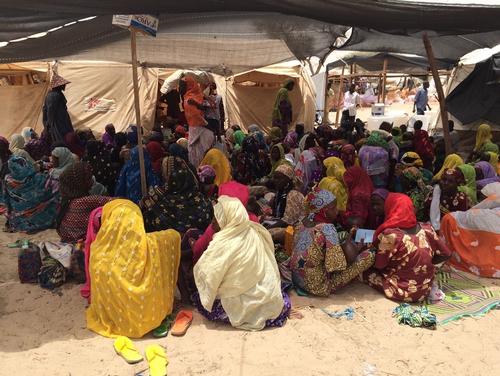
Diffa
To improve healthcare for the local and displaced population, MSF is working alongside the Ministry of Health in the main maternal and paediatric health centre in the city of Diffa, in the district hospital in Nguigmi town and in several centres in the districts of Diffa, Nguigmi and Bosso. Since the beginning of June, MSF has also been providing assistance at the Garin Wanzam site and in Kintchandi, where tens of thousands of displaced people settled after the 3 June attacks in Bosso.
In the mother and child health centre in Diffa, MSF ensures free access to healthcare for the local population, as well as refugees and displaced people. The team supports the treatment of children under 15 in the outpatient and inpatient departments. From January to June 2016, more than 8,300 consultations were carried out and over 630 children were hospitalised. MSF is also supporting the maternity department, and during the first six months of 2016 more than 870 deliveries were assisted.
In Nguigmi, MSF is supporting the paediatric and obstetric emergency departments of the town's district hospital. During the first semester of 2016, MSF supported the treatment of 207 children and assisted 763 deliveries.
MSF also works in six health centres in Diffa region: in Ngarwa and Kitchandi (in Diffa district), in Nguigmi, Ngalewa and Bilabrim (in Nguigmi district) and in Toumour (in Bosso district). From January to June, over 73,800 consultations were carried out in these health centres. The organisation is also providing healthcare in Garin Wanzam site (Diffa district), where newly displaced people settled after the 6 June attacks in Bosso.
In addition to medical activities, MSF is also providing water and is building latrines for the recently displaced population living in Kintchandi and Garin Wanzam.
In mid-July, MSF teams conducted a measles vaccination campaign in Garin Wazam, Kintchandi and Gagam (another site where recently displaced people have settled). More than 24,000 children aged between 6 months and 15 years were vaccinated.
Due to the high level of violence and trauma that people in the region have faced, MSF has launched specific psychological care activities in the supported health centres for host and displaced populations. Between January to June 2016, almost 3,000 people received psychological support. Most mental health consultations were caused by conflict, medical conditions and loss or separation of family.
MSF is still supporting the health centres in Assaga camp and Chétimari village. In early June, in light of the decrease in the number of consultations, MSF decided to close its basic healthcare clinic in Gagamari and concentrate all its activities in Chétimari health centre, a few kilometres away.
Also in early June, violence erupted in the Bosso area. As a consequence, around 7,000 people arrived in Diffa town. Since the middle of June, MSF teams have been supporting two additional health centres in Diffa with mobile clinics, in Bagarra and Chateau, areas where most of the newly displaced people are concentrated.
In May and June an average of 4,500 medical consultations were carried out in all facilities.The main pathologies were respiratory infections, diarrheoa, eye infections and malaria. In June, teams carried out around 50 deliveries and provided more than 850 antenatal consultations. The teams vaccinated around 1,960 children in the supported health centres.
In July, a catch-up vaccination campaign against measles was carried out in Diffa city and Chetimari, targeting around 40,000 children aged under five.
CAMEROON
Maroua
MSF has been working in Minawao refugee camp since February 2015, providing medical care and conducting water and sanitation activities. MSF is providing 4,000 to 5,000 medical consultations a month, mainly for malaria, respiratory tract infections and diarrheoa. There are approximately 50 admissions for malnutrition per month. The MSF medical team also offers reproductive healthcare, including antenatal and postnatal consultations.
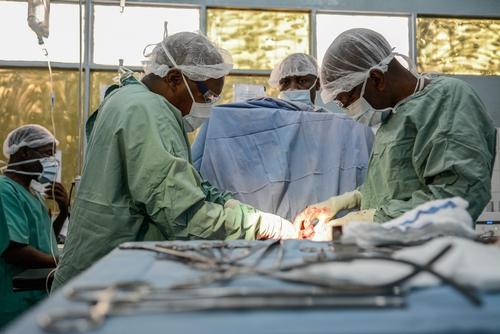
In Maroua, MSF supports emergency surgical activities at the Ministry of Health hospital.
In August last year, MSF started providing nutritional and paediatric services in Mora district hospital and 380 children were admitted monthly. Basic healthcare consultations are also provided in two health centres in the town, where MSF teams offer reproductive health services and treats children for malnutrition, diarrheoa and malaria. Some 41,000 internally displaced people live in the area but there are few fully functioning health structures. Outpatient consultations increased to around 5,000 per month, but this can probably explained by heightened insecurity and attacks in the area.
In case of emergency, severely wounded cases can be referred to Mora hospitals, where MSF supports the Ministry of Health with emergency surgical activities.
MSF continues to provide support to local health authorities to help respond to mass casualties following violent attacks. On 17 February, MSF treated 75 people wounded after a suicide bombing rocked the town of Mémé. MSF is also assisting the Cameroonian Ministry of Health with mass casualty training for medical staff in different parts of the country.
Kousseri
There are tens of thousands of refugees and internally displaced people scattered around Kousseri, near the Chadian border. The majority are hosted by local communities and have little access to medical services and humanitarian assistance. MSF is scaling up its activities in the area.
In June, MSF started providing surgical and obstetric care at the Kousseri district hospital. In May, 390 surgical interventions were carried out. In September, in order to respond to the needs of the local and displaced population MSF started to provide nutritional paediatric services at the hospital and in three health centres in the vicinity. During May, 173 children were admitted to the hospital and 138 were treated at the inpatient therapeutic feeding centre. An additional 330 children received treatment in the outpatient nutritional programme.



